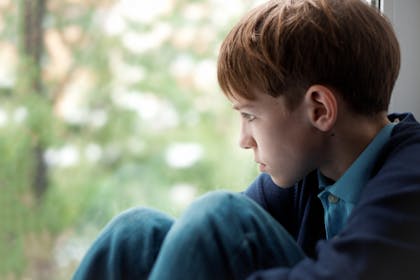Teenage bedwetting

Teenagers usually don't like to talk about bedwetting (the medical term for bedwetting is nocturnal enuresis) and feel embarrassed to ask for help; they often think that wetting the bed is something that only affects young children or old people.
This page contains affiliate links, which means we may earn a small amount of money if a reader clicks through and makes a purchase. All our articles and reviews are written independently by the Netmums editorial team.
But this is not the case; research tells us that about 1 in 40 teenagers wet the bed - it is not because they are being lazy or childish, there are physical reasons why bedwetting happens and the good news is that something can usually be done to help - find out more below ...
Some things to try
- Make an appointment with the doctor to check that there is no urine infection (UTI) or constipation
- Ask your GP or school nurse for a referral to a bedwetting clinic for an assessment and help to resolve the problem
- Drink about 1.5-2 litres of water based drinks spaced out through the day (more if very active or if the weather is hot)
- Keep a diary to take to the doctor that will show the pattern of the problem. Also make a record of daily drink intake to see if any particular drink makes things worse (such as coffee, fizzy drinks or alcohol)
- Think of ways to manage the problem in the short term, such as wearing washable absorbent pants or pads, or use waterproof bedding protection (available from ERIC)
What can help teenage bedwetting?
There are a number of known physical causes and interventions which include:
- The bladder fills but the signal to wake doesn't get through, causing the bladder to empty during sleep. A bedwetting alarm can be very effective in strengthening the signal to wake - the alarm sounds as the bladder starts to empty and the teenager learns to react to the alarm by waking and holding on. Gradually they learn to wake to the signal that the bladder is full.
- The lack of a hormone called vasopressin causes the kidneys to make a lot of urine at night. A medicine can be prescribed which mimics the hormone and reduces the amount of urine made (desmopressin).
- A bladder muscle that is overactive contracts and empties before it is full. Medication can be prescribed to relax an overactive bladder (oxybutynin).
- An inherited genetic tendency.
- Stress, anxiety and tiredness can sometimes make bedwetting worse, or trigger it off.
It is important to note that these treatments don't always work in every case. Your doctor may need to try more than one.
Where to go for help
Your GP or school nurse is usually the best person to talk to about the problem. They will often be able to offer treatment or refer you on to a clinic that is run just for this purpose. There is no need to feel embarrassed talking about continence problems; everyone is different, so an individual assessment is the best way to decide what treatment will help in each case.
ERIC, The Children's Bowel & Bladder Charity
What can ERIC offer you?
A confidential Helpline: 0808 169 9949 is available (Monday to Friday, 10am - 4pm; and Tuesday and Sunday 6.30pm -9.30pm) to provide information and a ‘listening ear'.
Website: www.eric.org.uk for information, message boards and downloadable leaflets.
Webshop: www.ericshop.org.uk for practical resources to help deal with bedwetting including alarms, books and bedding protection.
This information has been provided by ERIC, The Children's Bowel & Bladder Charity.


